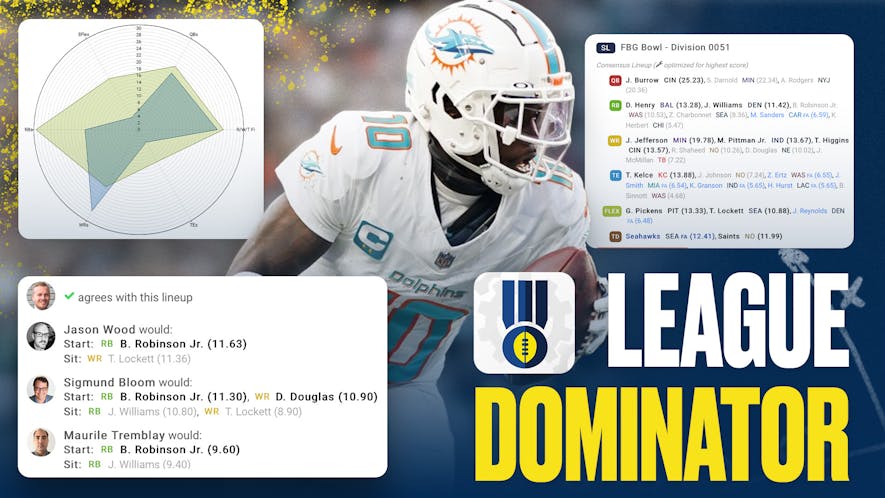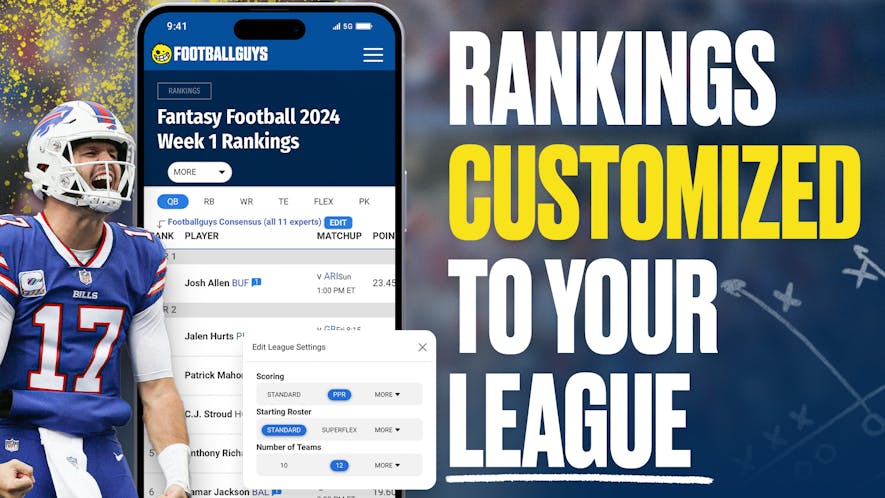
The Footballguys staff got together to discuss various dynasty-themed topics as we head into the offseason. This series of articles is designed to give you a boost of knowledge on the dynasty front covering several relevant and pertinent topics over the course of the offseason. Below is the third installment of our collaborative discussion.
Other offseason dynasty discussions:
- When is the best time to deal players and picks?
- How do you know when to sell high and buy low?
- Which aging veterans are you targeting in the offseason?
- What is your perceived dynasty value of impending, notable free agents?
We generally try to sell players just before or at their production pinnacle, but sometimes we wind up rostering a player who is past his peak. What tips can you give for strategies on how to unload a player who is past his peak?
Sigmund Bloom
Know that just holding the player and harvesting whatever value is left (which is probably more than their trade value) is a better option than just giving them away, or alternatively, if you can't picture starting the player unless the rest of your roster is abducted by aliens, just release them -- especially if you are in a dynasty league with a fat waiver wire - i.e, there are always players you want to pick up, but that would require cutting players you don't want to release, or otherwise, you see players that were released often immediately added by another team.
If neither of these paths works for you, then you have to hold and hope for a small hot streak inseason to rekindle a market for their services.
Jason Wood
One of the best ways to compete in dynasty leagues is acquiring older players who still have major roles. Too many dynasty managers worry about Year N+1 and N+2 and N+5 at the expense of this year. Use that to your advantage. If you can acquire a 33-year-old starter that projects as an every-week contributor in 2021, in exchange for a third-round rookie pick, why not? On the other hand, if you genuinely believe a player is past their prime, don't be afraid to give them up for pennies on the dollar. If they're someone you would consider cutting or only using if your projected starters get hurt, then don't fixate on trying to get a haul back and tricking another manager. Just take whatever you can get to help yourself elsewhere. I've found it's often easy to trade an older quarterback during a rookie draft to move up a few picks, as an example.
Jeff Tefertiller
As Jason said, some players will be undervalued due to age but are worth holding. Julio Jones is getting to that point as he will be productive as long as he is in the NFL. I recently saw him valued as a late-first/early-second round pick and thought two to three years of declining Jones production is worth way more than this price tag.
With their limited career span, running backs must either be purchased when young or very cheaply -- if not both. A 25-year-old back does not have that many years left. He may have fewer elite years than a 30-year-old receiver. Also, the better the back, the steeper the decline. Guys like Derrick Henry do not go quietly into a reduced role. Same from Elliott.
Quarterbacks over the age of 30 have been undervalued in single-quarterback leagues. With the longevity at the position, age becomes a lesser concern. Volume, efficiency, and potential rushing yards are more important.
Dave Kluge
Sometimes, people become so infatuated with turning every aging asset into a shiny, new toy that they forget that veterans can be relevant in dynasty leagues. If you’ve held a player past his prime, there are two moves that I’d recommend, and neither of them involves selling for pennies on the dollar. The first option would be to ship them off for above their market price to a contender in the offseason. Teams looking to gear up for a championship run could use guys like Julio Jones and David Johnson heading into 2021. The other option would be to simply hold as Sigmund and Jason suggested. I’d rather roster an effective veteran until the wheels fall off than end up with a shot-in-the-dark third-round rookie pick. In addition, those productive veterans will start to increase in value as contenders gear up for a championship run midseason. Selling low on an over-the-hill veteran during the offseason is one of the worst moves you could make. I’m a proponent for buying them if your leaguemates are desperately trying to sell and putting yourself into a position to contend.
Andy Hicks
These players are best used as part of package deals or traded when they are hot. Someone like Julio Jones is not going to be huge every game, but when he is, that is the perfect time to move him.
Troy King
Yep. I was just gonna say this. My main two strategies for this are packaging and big-game timing. For the packaging aspect, I add that player as a throw-in piece in order to sweeten a trade. As far as timing, I will wait until the regular season and hope for that player to have a big game and attempt to immediately sell to a contender. Normally, that’s when I have been most successful in offloading players before a big drop-off. If that big game doesn’t happen, I will just implement the packaging strategy.
Will Grant
I think dynasty owners can tend to become vested in a player -- especially if they have enjoyed a season or two of solid performance from them. Nothing feels better than drafting or trading for a player who takes off and is a staple in your lineup for a couple of seasons. These guys will always have value, but we can also sometimes hold them longer than we should.
Jeff Haseley
Excellent point, Will.
Will Grant
As others have pointed out, switching your mindset to a redraft league win-now approach can be helpful in unloading a vet who may not have much long-term value. Looking at remainder-of-the-season value or even playoff value can help you package that player and move them to a playoff team.
Targeting good teams who may be feeling a short-term injury crunch may also be a possible trading partner. A team may come into a bye week a player or two short because of injury and they need a bridge to get them over the hump. A solid veteran who is producing is usually a better option than grabbing a random person off of the waiver wire who you may use for a week or two and drop.
Chad Parsons
I would pivot and think about keeping players past their prime. Recent examples would be Tom Brady, Drew Brees, and Philip Rivers types in Superflex formats. Brees may be retiring off dynasty rosters this offseason. Is that a failure by a dynasty GM? One example is I traded for Brees two or three seasons ago, when he was left by the side of the dynasty trading road in many league markets and assumed to have one middling season left, for a second-round pick. Fast-forward to now, and Brees has aided my contender for multiple quality seasons. Each season, options like Brady, Brees, Rivers, etc. play is house money when discounted heavily. Should dynasty GMs run for the hills and trade away Julio Jones for a mid-second round pick for example this offseason? I would advise against that with these all-time types of players. If anything, get part of a season more of production from them and explore selling inseason, not the least optimal timing of the offseason for rookie capital, which is going along with the market to get the least bang for your trading buck. If anything, embrace variance. I dealt a late pick in FFPC Superflex for Drew Brees recently as an example of embracing the variance. If he plays in 2021, I win this trade by a massive margin. If he retires, I lose a late-round selection which is marginally more valuable than a waiver wire pickup down the line in the shallow roster format.
Adam Wilde
Having a player past their prime is not always the worst thing. At some point, we have to value wins as well. If we can win with all ascending players, that is fantastic, but it's extremely difficult to pull off. Sometimes you have to ride into the sunset with Julio Jones and Derrick Henry because you will never get the value for them via trade that they provide to your championship push.
That said, if you are not pushing for a championship, be willing to lose the trade. Often times the loss you take on a player like Jones doesn't look like a loss just one year later. For reference, I felt Jones was an expendable piece of a very good roster I had last season, so I traded him for DeVante Parker and a 2021 first-rounder. I didn't feel great about it then, but I'm certain I couldn't get a first-round pick alone for him now.
Questions, suggestions, and comments are always welcome to haseley@footballguys.com


